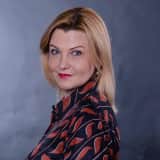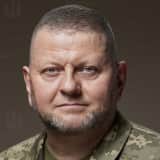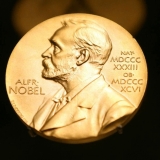Children of the Maidan
In memory of Mykola Haievoi,
Ukrainian historian,
a volunteer with the 95th Separate Air Assault Brigade
of the Armed Forces of Ukraine
The winter before last, to make the time pass a little faster during the endless night shifts in our frozen trench near Kupiansk, I came up with a game. Basically, you try to look at recent news headlines through the eyes of yourself ten or so years ago – from the point of view of an average citizen of Ukraine in 2013. A quick recap of the context: Viktor Yanukovych, whose regime seems to be outlasting all his opponents, is president; the education minister is the future collaborator Dmytro Tabachnyk; and none other than Vladimir Putin together with his pocket patriarch are praying for the "union of the souls of our peoples" on St Volodymyr’s Hill above the River Dnipro, in the very heart of Kyiv. Now what do you think of these headlines?
"Our country of the year can only be Ukraine – The Economist";
"US Congress gives president of Ukraine a standing ovation";
"Russian army defeat in Ukraine: Russian losses break records";
"Ukraine officially starts EU membership negotiations";
"Ukraine’s army is ranked fourth most powerful in Europe".
And finally my personal favourite, a relatively recent one: "First military commandant's office is set up in Ukrainian-controlled territory of Kursk Oblast".
The value of this thought experiment lies not only in its vivid illustration of the thesis that there is nothing less predictable than history. Above all, it enables you to understand how impressive a journey Ukrainian society has been on over the past eleven years.
Various things happened along the way. Sometimes we flew forward at top speed, as if wearing Hermes’ winged sandals. Sometimes we trailed behind like tortoises. Sometimes we got lost on the way. But the important thing is that whenever we found ourselves at a crossroads that could not be bypassed, we chose the right direction to go in, and we were brave enough to follow that path to the end.
Sooner or later, every nation faces what philosophers call a "liminal situation". This is a point of bifurcation, a defining moment in the historical process when society is confronted by a brutal dilemma: either try to jump out of the impasse to the next stage of development – using all available resources, but without any guarantees – or perish. The best case is preventing a long, painful and likely irreversible decline. If a nation is strong enough to overcome this existential challenge, it is born again, building its own renewed identity around what it has just experienced. This is how an Event with a capital E arises.
Nation and Event
Unsurprisingly, the culmination of a national Event usually coincides in time and space with the act of proclamation and/or restoration of the state in question. A textbook example is the American Revolution of 1775-1783, also known as the American War of Independence from the British Empire. The liberation of the numerous peoples of Hindustan from the rule of the same British Empire in 1947 resulted in the simultaneous establishment of two new states – India and Pakistan. In the vast expanses of China throughout the first half of the 20th century, there were at least two competing projects of modern national statehood. After the communists’ victory in the civil war on the mainland, one of these came to power in Beijing, while the other was forced to withdraw to the island of Taiwan, where it found a safe haven for the next 70 years.
In Europe, the general rule is that the further east you go, the later it was, on average, that the local modern nations got firmly enough on their feet to lay claim to their own Event. Here the French Revolution of 1789-1799 is an ideal type, so to speak, echoes of which can still be heard everywhere in the country with an untrained ear. If we consider the unification of the scattered lands between the Rhine and the Baltic Sea into a single state as the key Event in the history of the German nation, at least in the 19th century, then it turns out the Germans lagged behind the French by almost a hundred years.
More of the same followed. The Poles only managed to restore and hold onto their own statehood in 1918-1921, when all the empires that had ripped the old Polish-Lithuanian Commonwealth apart and divided it between them in the late 18th century collapsed one after the other. The three Baltic republics gained independence at the same time. With a few exceptions, the Founding Events of the rest of the nation-states of Eastern and Central Europe also took place between the second half of the 19th century and the end of the First World War.
As regards our intrusive neighbours to the east, there is ongoing debate in academic circles about whether the Russian nation is sufficiently formed even now. This in no way prevents the Russians from fervently trying to convince the whole world – and above all themselves – that their great Event dates back to May 1945. But as always, they’re lying. The victory over German fascism is undoubtedly the common property of the allies in the anti-Hitler coalition, including all the peoples of the former USSR.
It might seem that Ukraine’s Event should also be sought somewhere in the maelstrom of the crazy 20th century, because without the liberation struggles of 1917-1921 and the 1940s, for example, it’s impossible to imagine the crystallisation of national consciousness that eventually became one of the prerequisites for the declaration of state independence. However, while attempts to win sovereignty by armed means in the first half of the 20th century unfortunately resulted in defeat (a thousand times heroic, but still a defeat), Ukraine’s exit from the USSR under the leadership of the local communist nomenclature was, rather, a historical necessity. And indeed, when the residents of the Ukrainian Soviet Socialist Republic suddenly woke up as citizens of Ukraine on the morning of 25 August 1991, most of them had no very profound experience of this metamorphosis, since to some extent it had happened without their agency.
The process by which the newly born Ukrainian civil society came to self-awareness was slow but inevitable – until in autumn 2004, it hit a wall that all fledgling republics run into, known as "administrative resource". The test of the nation's strength in confrontation with the then government, which, following the example of its Russian, Belarusian and Central Asian counterparts, had felt able to rig the results of the presidential elections, proved successful but politically infantile. The quick and bloodless success of the Orange Revolution gave Ukrainians faith in their own strength, but it also equipped them with the moral right to abdicate responsibility just as the protest’s main demand was fulfilled. No sooner had Viktor Yushchenko been declared the guarantor of the Constitution than the nation, having delegated all power to him and his entourage, dispersed to their houses on the outskirts as rapidly as they had previously assembled in central Kyiv.
The revolution had won, but an Event had not taken place. This happens when a very young society, content with early successes, allows itself to believe prematurely that "the Moor has done his work, the Moor may go". To say in this context that President Yushchenko’s political life story after 2004 speaks volumes would be an understatement. Yushchenko himself seems to be aware of how quickly he turned from an engine of great hope into a symbol of unfulfilled expectations, personifying the fate of the movement that brought him to power.
Exactly a decade later, the opportunity arose to put things right and to pass a decisive test of the maturity of a political nation – at the same time and in the same place.
Integral democracy
Alain Badiou, the patriarch of modern French philosophy who has devoted the lion's share of his intellectual labour to developing the category of the Event, has emphasised that an Event is always the product of joint purposeful activity by people who are united around a certain set of values. An Event, unlike the Situation that precedes it and is formed under the influence of more or less objective factors, does not arise "by itself". Its foundation is built by a person's readiness to make a choice at a critical moment, and therefore to be held accountable for it to the extent that is necessary. When a sufficient number of such people find each other and notice that their choices coincide, a powerful agent of the historical process emerges, composed of a multitude of concrete personalities. Each of them feels like a conscious participant in social creativity, so to speak, a co-author of time – and they truly are, at least as long as the window of opportunity outlined by the Event remains open.
This incomparable, sometimes almost orgasmic feeling can be described – to tweak Albert Camus’ famous aphorism a little – as "We rebel, therefore I exist". During the long winter of 2013-2014, on a utopian island surrounded by fire and ice in the heart of a European metropolis, we experienced this day after day in every cell of our bodies.
The Revolution of Dignity was an epiphany, a manifestation, a breakthrough of History as such. The area of freedom it created allowed the active minority of society that was involved in the process to realise their own potential in creating the future. The Maidan was co-authored by people from almost every age group, but two generations deserve to be singled out. For the older of the two – those who entered the late Yanukovych era at a mature age (30-55, the largest stratum of protesters in terms of numbers) – the revolution and the subsequent period became a zenith, the high point of political agency. For the younger generation, aged between 15 and 25, it was a formative event that largely determined their values, beliefs and lifestyle for decades to come.
A battle was being fought for the content of the national project: the visions of Ukraine’s future as advocated by the government and by the most active part of society finally diverged following Viktor Yanukovych's refusal to sign the EU-Ukraine Association Agreement and the brutal violence meted out to the young people on the Maidan who disagreed with that decision. The very symbols of the state became a battleground. Officially, Ukraine’s coat of arms, national anthem and flag belonged equally to the authorities and the opposition, to the Maidan protesters and the Berkut riot police. But after 30 November 2013, the world views that the opposing sides invested in those symbols became mutually exclusive.
After the first few days, when the parties tested their own strength and discovered with surprise that they had no idea how to force the enemy to surrender or at least retreat, an uneasy balance was established. For several weeks, the past and the future coexisted in this space above the intersection of the capital's metro lines. The Rubicon whose crossing condemned this schizophrenic superposition to collapse was the escalation of violence by the authorities, unheard of in the social contract of post-Soviet Ukraine.
The blood of Serhii Nigoyan, Mikhail Zhyznevskyi and Yurii Verbytskyi – the first among the equal knights of the Heavenly Hundred – sanctified the protest. Any possibility of political compromise, mutual concessions for the sake of returning to the usual timeless stability, was buried with the dead. The multiplicity of scenarios for settling the crisis that had been potentially open on the eve of 22 January collapsed in one moment into a dilemma: revolution, the forceful overthrow of the existing regime whatever the cost, or terrorist dictatorship. To understand what would have been in store for us if the Maidan had failed, there is no need to travel to an alternate version of the Multiverse. You only have to look at modern Belarus, which since the crackdown on the August 2020 protests resembles something between Latin American autocracy and the classic fascist regimes of the 1930s.
The authorities had carefully prepared favourable positions for themselves. Dictatorial laws were passed in the Verkhovna Rada (Parliament) in violation of all possible procedures as early as 16 January – less than a week before the first protesters were killed. It is telling that the package of legislation voted in on that day, which was supposed to bring 22 years of democracy in Ukraine to an end, contained a version of the Russian law on "foreign agents". The latter not only turned out to be a convenient cross-border tool for suppressing civil society, but also became a kind of legal calling card whose appearance in the consideration of the national parliament was an unmistakable indication that the "Russian world" had already begun to swallow up this once independent country. The tragedy of Georgia which has been unfolding before our eyes in recent years looks even more instructive from this perspective.
On the opposite side of the barricades on Hrushevskyi and Instytutskaya Streets at the end of January 2014, there were no doubts either. In his perceptive book The Road to Unfreedom, which is largely devoted to Ukraine, Timothy Snyder cites the testimony of an ordinary 53-year-old female activist: "My friends are both Jews and I am a Polish citizen, but we walked together, as Ukrainian patriots, convinced that our lives would be of no value if the protests were crushed now."
Every published recollection by those who took part mentions how the Maidan, sanctified by the sacrifice of its defenders, overcame the alienation between people that is characteristic of modern societies. This process moved along two closely intertwined trajectories: we simultaneously learned to love and hate truly, in the way that only a person who has just found a family – and risks losing it at any moment – is capable of. The cold gleam of Maidan fury can still be seen today in the methodical movements, devoid of all fuss, of a mortar gunner near Vovchansk, or in the concentrated calm of a Special Operations Forces sniper in the grey zone in Kurshchyna waiting for hours for an opportunity to fire a single shot.
Love for comrades filled the Maidan – and the maidans, those enclaves of the revolution in the regions that spilled abundantly over from Kyiv to the rest of the country. Its manifestations, methods of practical conversion into good deeds, are physically impossible to calculate and systematise, but there is one whose significance for the nation’s survival endures even today. Ukrainian volunteering, engendered by the Event, is a phenomenon unparallelled in 21st-century Europe in terms of scale and duration. According to a study by the Democratic Initiatives Foundation, 20% of the population took part in the Revolution of Dignity. About half of these people collected and delivered everything the protesters needed: belongings, food, money, materials, equipment and hardware.
The role played by volunteer activists in the early years of the war in Donbas, as the state gradually returned to life, cannot be overstated. In fact, during my service in the 24th "Aidar" Assault Battalion in 2014, the only item I received from the Armed Forces was a rusty Kalashnikov and a modest amount of ammunition. Everything else, from my socks to my body armour, was provided by caring Ukrainians.
Even now, with the state and the army firmly on their feet, it is impossible to overestimate the volunteer movement. The communities created in or inspired by the vortex of the revolution have turned into vast and complex institutions that move the country forward every day. This is especially clear when it comes to high-tech defence-related industries: Ukrainian unmanned systems, which a few years ago were mostly being developed by small groups of enthusiasts, are giving the products of global businesses a run for their money today.
It’s an almost Hollywood-like success story that can’t be understood unless you go back to its roots. 2014 compelled the nation to master the skills of organising utopia – making everything out of nothing. Volunteering became the core of the ethics of the free people cultivated by the Maidan: from each according to their abilities, to each according to their needs. The problem of effective distribution of public resources that generations of communist theoreticians had fought over was solved by revolutionary Kyiv in a completely modern spirit: through self-organisation via networking, taking full advantage of the potential offered by Twitter and Facebook.
Over the past decade, several influential intellectuals have noted that postmodernism died on the Maidan, as the Revolution of Dignity rejected ironic relativity in favour of the assertion of truth, particularly at the cost of its supporters’ lives. However, there is something else that few people have paid attention to: on the Maidan, the Republic was born again in the primary ancient meaning of the word, worn out from everyday usage – literally translated from Latin, a "common cause", res publica. This sudden yet natural discovery in the whirlpool of revolutionary creativity allowed us to find the heart of our own national project. The impact of this discovery on many of the witnesses and participants in the process was not long in coming.
How I became a Ukrainian
The first time I found myself on the Maidan was in December 2013. As a recent history graduate from Simferopol, Crimea, who had only ventured out from his cosy province near the sea a handful of times in his 20 years, I was anxious to see the revolution up close, because when would I get such an opportunity again? I did have concerns about the "danger of aggressive Ukrainian nationalism" as well. I’d occasionally worn a vyshyvanka [a traditional embroidered shirt] in my sun-drenched, wine-soaked youth, mostly to annoy the local Soviet public, but I harboured many prejudices created by the hermeticity of life on the Crimean peninsula, where time seemed to have stood still in the late 1980s.
The people around me didn’t identify much with Ukraine, but neither did they identify with Russia. They remained, as it was fashionable to say in the last political season, "somewhere in the middle", often by completely renouncing national identity in favour of self-determination based on regional characteristics: Crimeans. The well-known saying that "there is no land beyond Perekop" [the isthmus that connects the Crimean peninsula to the mainland – ed.] was perceived by us as the practical border of our own oikumene. The comfort zone ended where you had to drive more than two or three hours to get to your favourite beach. This didn’t mean we despised the state we were part of, just that we had no business with it. As a matter of fact, nor did it with us until 2014, to be honest.
Crimea’s equidistance from various centres had allowed it to drift between the stormy waters of history for decades, assiduously pretending that nothing was happening around it. The peninsula was asleep, and saw itself as an island in a dream. Here the late Soviet mentality, based on paternalism and infantilism, merged with the thirst for enrichment characteristic of the era of primitive accumulation of capital, with no hint of social responsibility. All this combined to turn this autonomous area into a kind of preserve of this less-than-ideal period in the history of post-communist countries. The internal cohesion of the small Crimean Tatar community against the background of general selfishness and inertia seemed to be the exception that proved the rule.
So you can imagine with what stunned delight I walked in the midst of a living sea under the walls of St Michael’s Golden-Domed Monastery, where I set off on my journey to the Maidan. Almost all the people with whom we struck up a conversation, or even exchanged glances with for a couple of seconds, were not simply friendly. Calling them "friendly" is like trying to describe the beauty and majesty of thermonuclear fusion using primary school science concepts. They behaved as if they had known and loved you – you, a random stranger – all their lives, until finally the long-awaited opportunity had arrived to treat their dear guest to tea and almost force-feed him the most delicious sandwich in the world. Why? Obviously because the revolution considered each person in the context of the common cause – a new social contract was being written on the streets of Kyiv with barricades, donations and Molotov cocktails. Joining this process, even if initially in the role of a passive observer, meant becoming part of a family that cares about its children. This was a universal experience – which is, after all, one of the hallmarks of the Event. But for Crimeans, with our island consciousness and archaic political culture, it felt like a miracle was swirling all around you, live on air.
On the Maidan, every participant saw the nation – and in this way, the nation saw itself. Unlike in 2004, this mirror reflected back not the profile of a political messiah known to all, but infinite eyes of concerned citizens. As Andrii Bondar aptly put it, "Maidan was a laboratory of the social contract, bringing together an IT worker from Dnipropetrovsk and a Hutsul shepherd, an Odesa mathematician and a Kyiv businessman, a translator from Lviv and a Crimean Tatar peasant."
The sociology of the Revolution of Dignity backs up academic ideas about nation-building usually referred to as "constructivist". Researchers from this school view national identity not as something given to a person at birth, simply "by virtue" of having been born in a specific ethno-cultural environment, but rather through the prism of his or her more or less conscious political choice. Identification with the community is key, therefore the nation – "moral consciousness" and "great solidarity", as defined by Ernest Renan – appears where there are people who aspire to be it. The Event category comes in handy here as well, enabling you to localise the outbreak of the process in time and space. It is undeniable that the events of 2013-2014 contributed to hundreds of thousands, if not millions, of holders of passports with a trident on the cover realising for the first time in their lives that they belonged to the Ukrainian national project. I was lucky enough to be one of them.
There and then, something important and irreversible happened to me – to all of us. I don't know about "Nuland's cookies", but the Maidan fed its participants with Morpheus' red pills to their heart's content. The first rush from the intoxicating sense of agency, the heartbeat of the revolution that beats in your own chest, turned out to be so powerful that it drives generations to this day, compelling people to do things that seem strange to anyone who hasn’t experienced it. Such as going to protests instead of relaxing with your family. Or crawling under the machine guns of the "world’s second-greatest army": first in 2014, and then in 2022. Because when the Maidan followed you wherever you went, and you pictured the dull sheen of Nigoyan's eyes, you couldn’t do otherwise, even if you really wanted to.
It was the eve of the New Year 2014 and I was standing on a dilapidated covered platform on the Kyiv-Simferopol train when the realisation of this transformation hit me. Calming myself down by chain-smoking cigarettes from a pack of blue Pryluky that a volunteer had given me a couple of hours ago outside the Trade Union Building, I was returning home a fully formed carrier of Ukrainian political identity, because I passionately wanted to belong to it. Like a high-quality stimulant, that heady mix of pride, exhilaration and unrelenting responsibility, impossible – and unthinkable – to delegate to anyone else, left me with no chance of sleep that night.
The long year of 2014
The next time I plunged into the Maidan was on 21 February 2014. Local centres of the revolution were now operating more or less actively in several Crimean cities, but all eyes were, of course, on the capital. I was invited to represent the peninsula at the audience vote on the political talk show Shuster Live. Taking advantage of this opportunity (priceless for a new graduate like me) to travel to Kyiv at the organisers’ expense, I called a friend from the Crimean Maidan self-defence unit as soon as I got off the train at Darnytsia. He asked me not to delay.
On Shuster's show that night, the deputy speaker of the Verkhovna Rada, Ruslan Koshulynsky, eloquently explained why the president was still strong and would definitely not be resigning voluntarily. I listened to him, but I was mostly looking at the journalist Pavlo Sheremet, who was sitting on the sofa next to the lawyer of the then imprisoned Yuliia Tymoshenko. Pavlo had an extraordinary look about him: attentive, open, and at the same time sceptical. This is how people look when they are passionately certain about what they are doing and what they believe in. A few days later, back in Simferopol, I would have the opportunity to meet another person with the same look – the film director Oleh Sentsov, one of the leaders of the Kyiv Automaidan, who would shortly head our activist group.
The show ended late in the evening, but there was still the ghost of a chance of catching a bus to the centre of town. When I took my phone out of the locker in the studio lobby, the first thing I saw was about fifty missed calls from my mother, and I immediately realised that hoping to keep my trip to Kyiv a secret wasn’t the smartest idea when you have to sit in front of the cameras for several hours of live political prime time during a revolution. As it turned out, when I called my mother back, the revolution had already won.
On the night of 22 February, the sleepless Maidan woke up to the news that Yanukovych had fled. The dictator had finally been removed from power: perhaps not in the way many of us had dreamed of, but the protest had succeeded. Nevertheless, the air was saturated with a sticky black dust, and there was nothing remotely festive about it. Instead, there was mourning mixed with wary anticipation. And there were also a lot of confused, exhausted faces. Many of these men and women were not destined to rest: when the Russian invasion began, the revolutionaries would swap their baseball bats and stones for assault rifles, and the front line would shift from the Pechersk Hills to faraway Donbas.
As the Soviet song teaches, revolution is a process that has a beginning but no end. By launching a change of political regime after the removal of the dictator, the Maidan merely created the prerequisites for the implementation of its own programme, which involved the integration of Ukraine into the Western world, including the EU and NATO, thereby overcoming the consequences of centuries of Russian colonisation. Both of these interrelated demands were enshrined at the constitutional and legislative levels during 2014-2016. Meanwhile, the main slogan of the protests ("Glory to Ukraine!"), borrowed from the Ukrainian liberation movement of the mid-20th century, became the official greeting used by senior officials in the state apparatus. Numerous activists were dispersed across institutions at all levels and in all regions and industries, participating in the process of reform. With the outbreak of the war in Donbas, it was Maidanites who formed the backbone of the volunteer battalions, which in turn became one of the drivers of the astonishingly successful (as we see today) transformation of the Armed Forces of Ukraine and the national security sector in general. The Maidan became the state.
Unfortunately, the Anti-Maidan has also become one. More precisely, we are talking about a state that was Anti-Maidan long before the word appeared. Indeed, if you think about it, you won’t find any stable ideology in modern Russia other than this hysterical desire to stop history at all costs, to prevent the Event from happening, both on its own territory and abroad. The master of the Kremlin is perfectly aware of the "gendarme of Europe" function assigned to him by a thousand-year-old imperial tradition, just as he is, in fact, aware of the Maidan’s significance to Ukrainian nation-building.
"The source of all current power in Ukraine is a coup d’état," Putin asserted. "It [the Revolution of Dignity] has brought Ukraine the establishment of a regime in Kyiv that turned out to be dangerous for us," said his press secretary Dmitry Peskov, interpreting the dictator’s words with touching directness.
If the occupiers did indeed regard reinstalling Yanukovych in the event that the original plan for the "special military operation" worked out as a way of legitimising their power over the conquered state, then their logic is obvious: everything that happened in Ukraine during and as a result of the Maidan is a "perversion" and must therefore be erased from history through a symbolic restoration of the situation as it was prior to November 2013. "Symbolic" is the key word here, since in reality, of course, it would have been a parody of pre-revolutionary Ukraine, thoroughly cleansed of any hints of civil society, national consciousness, or democratic procedures.
As a result of the tectonic shifts initiated by the Revolution of Dignity, the post-Soviet world as we knew it spent almost a decade dying a slow and painful death until it breathed its last on the morning of 24 February 2022. In its place came two antagonistic future projects at once: a clash was inevitable, since the success of one means the death of the other. Over the following months, most of the world’s nations made their choice, becoming allies, whether openly or covertly, of one of the sides – the last geopolitical confrontation of comparable scope was the Cold War. Thus, the Maidan went global. Those protesters from snow-covered Kyiv, in their construction helmets and cheap gas masks, could scarcely have imagined the magnitude of the impact they would have on world history. Yet this is exactly what a real Event is: national in form, universal in content, global in meaning.
At first glance, this may seem strange, but historical time rarely coincides with calendar time. The point is that an Event, like a massive celestial body in astrophysics, organises time around itself, using its own significance for human societies instead of gravity. For example, in Western historiography, people often talk about the "long 19th century", the chronological framework of which is defined by the French Revolution and the beginning of World War I, or about the "short 20th": from 1914 to the collapse of the Soviet Union. By the same logic, it would not be an exaggeration to assume that a long 2014 is underway outside our window – a "long-lasting Maidan", one might say – because the effects of the Revolution of Dignity, like ripples on water, are now in their eleventh year of continuing to spread out in all directions. Echoes of our national Event can now be heard in one way or another in the most diverse corners of the globe: from the US, where aid for Ukraine has been a key issue in the presidential campaign, to the Middle East and North Africa, where food prices are rising as a result of Russian aggression.
Meanwhile, from a purely political point of view, the aspirations of the Maidan, except for the most superficial ones, have still not been realised. Like any great revolution, ours is measured not in weeks and months, but in years, if not decades. Given how far we have already come and the geopolitical situation that has been created by the nation’s ability to effectively resist the invaders, there is no doubt that Ukraine will sooner or later become a member of the European Union. Despite the seismic shock of Donald Trump’s return to the White House, few in the North Atlantic Alliance deny Kyiv’s key role in Europe’s post-war security architecture: NATO will need Ukraine no less than Ukraine needs NATO. And if one fine day, as a result of overexerting itself in a war of attrition instead of the week-long "special operation" it planned, the Russian Federation ceases to exist, at least in the form in which we know it, it will be safe to say that the Maidan has even exceeded its goals. Well, it's nice when a byproduct of being prepared to stand up for your rights is the collapse of the world’s last empire, isn't it?
***
Returning to the thought experiment at the beginning of this piece, a few other news headlines ought to be quoted.
"One million now dead or injured in Russia-Ukraine war – WSJ";
"UN says over 6.5 million Ukrainians have become refugees since start of Russian invasion";
"26% of Ukraine’s territory is mined";
"50% of Ukraine’s entire energy system is damaged", and so on.
Upon learning that a future like this awaited them, a significant number of the people I knew in 2013 would have been rightly horrified and instantly turned into staunch conservatives. They might have said it was better to leave everything as it was – not to muddy the waters and not to rock the boat. In fact, many people are now saying exactly that, and every day of the war intensifies those voices. But the truth is that during the revolution, society was not choosing not between the old and the new – in practice, such a choice never exists – but between two versions of the new: the version that has been unfolding in Ukraine since Yanukovych’s flight, and the one that we have been fighting against to the death for nearly three years.
If history really can teach us anything, it is that progress and freedom come at a high price. Few societies have been able to pay for their own Event with "little bloodshed"; in a comparative context, the price that Ukraine is paying every day is, despite its terrifying scale, more the rule than the exception. One could cite Benjamin Franklin’s well-worn quote, "Those who would give up essential Liberty, to purchase a little temporary Safety, deserve neither Liberty nor Safety" (or the paraphrase about freedom and bread attributed to Stepan Bandera), but at the moment it seems much more productive to clean one’s weapons and tighten one’s body armour.
Perhaps for the first time in many centuries, Ukraine is not just a stage on which the defining events of world history are unfolding – there’s nothing new there – but also their main actor. Badiou says that in order to fully reveal the potential that history has embedded in it, an Event requires its followers to be true to themselves. If we want to run this marathon to the finish line and not drop out of the race early from fatigue and burnout, we must remind each other of that choice we made in the central square of Kyiv eleven years ago. The Revolution of Dignity continues – and we will remain worthy of it.






